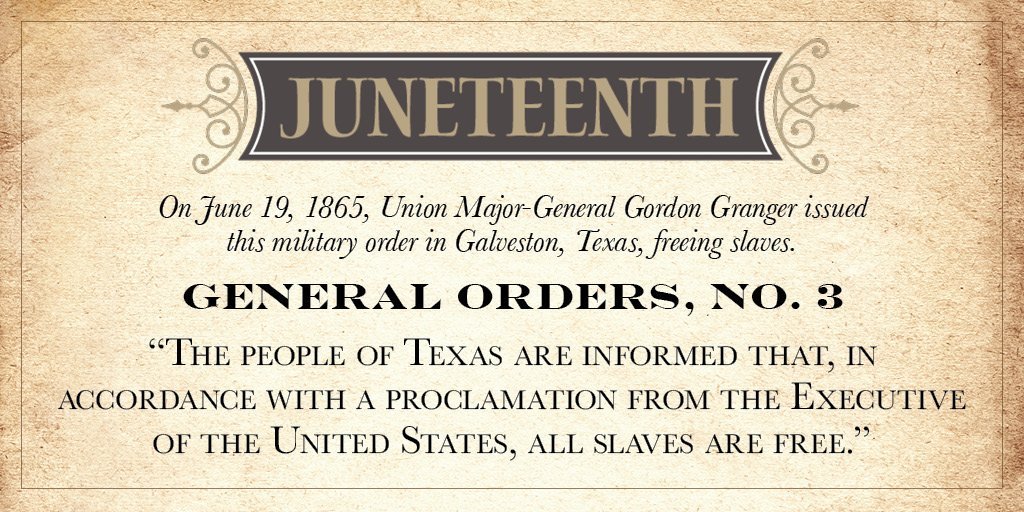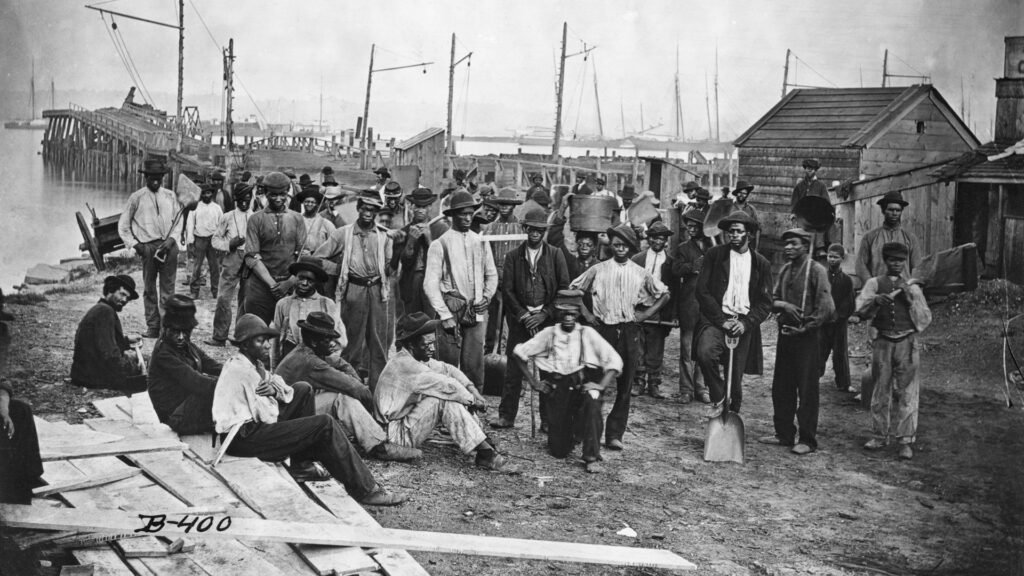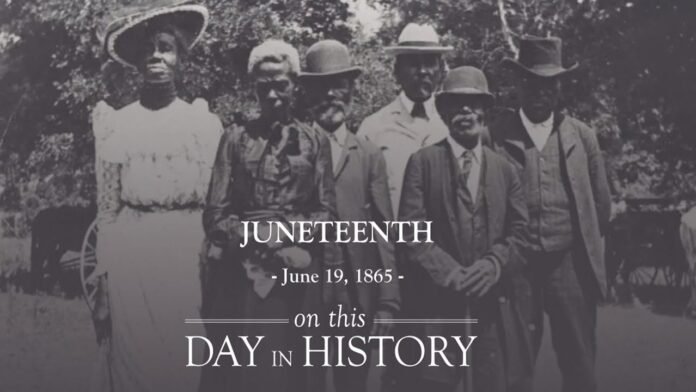In their tweet yesterday Tuesday the United States Embassy in Ghana announced that they will be closed to the public today Wednesday, June 19, 2024. This is in commemoration of Juneteenth – a U.S. federal holiday. Juneteenth is the oldest known celebration commemorating the end of slavery in the United States.
This came with a series of mixed reactions from followers of their tweet.

What is Juneteenth and Why is it a Holiday?
While July 4, 1776 marked the nation’s first Independence Day, it wasn’t until almost a century later, on June 19, 1865, that the United States could truly be considered a free country. Since then, June 19 — or Juneteenth, for short — has commemorated the end of slavery in the U.S. and freedom for citizens of all races

What Does June 19 Celebrate?
Juneteenth celebrates a second Independence Day in the U.S., according to the National Museum of African American History & Culture (NMAAHC). It’s a holiday commemorating the end of the Civil War and the emancipation of Black Americans, according to “A Proclamation on Juneteenth Day of Observance” by The White House.
Jennifer Braden, Americans with Disabilities Act (ADA) coordinator from the Office of General Counsel and Compliance at SNHU.Fannie Lou Hamer, an influential civil rights activist, once said, “Nobody’s free until everybody’s free” — a quote that Jennifer Braden, MEd, JD echoed.
Braden is an Americans with Disabilities Act (ADA) coordinator from the Office of General Counsel and Compliance at Southern New Hampshire University (SNHU).
For citizens who share Hamer’s belief, Braden said Juneteenth celebrates Freedom Day, also sometimes called Emancipation Day. Braden noted that the Emancipation Proclamation was largely symbolic and didn’t truly mark the end of slavery. While Juneteenth is ultimately celebrated as the start of emancipation, there were people in the U.S. who remained enslaved beyond June 19, 1865, as well.
The History of Juneteenth
On Jan. 1, 1863, President Abraham Lincoln issued the Emancipation Proclamation, which declared all people being held as slaves would henceforth be free. Two years later, on Jan. 31, 1865, the 13th Amendment was passed by Congress. It wasn’t until that summer, on June 19, 1865, that Union soldiers finally arrived in Galveston Bay, Texas, with news of freedom, according to the NMAAHC.
Dr. Kendra Thomas, Senior Director of people experience and belonging at SNHU said she first learned of Juneteenth and its history when she was 16 years old.
“I went to a Juneteenth festival and learned that enslaved people in Galveston, Texas, did not learn of their freedom until two years after the Emancipation Proclamation was made effective,” she said.
Misconceptions About Juneteenth
Although Juneteenth marks Emancipation Day, Jennifer Braden said that slavery persisted in Delaware and Kentucky, both of which lacked state laws abolishing the institution of slavery. It wasn’t until the 13th Amendment was ratified on Dec. 6, 1865 — six months after Union troops reached Galveston, Texas, on Juneteenth — that emancipation took effect in these states. Still, for herself and many others, Braden said Juneteenth is the quintessential holiday celebrating American freedom.
Tiffany Flowers, Financial Counselor at SNHU and an officer for the employee resource group BLAZE. “I think a common misconception about Juneteenth is that that was the end of the story,” said Tiffany Flowers, a financial counselor at SNHU and an officer for the employee resource group BLAZE (Black Leaders Aspiring to Zealously Elevate).
Flowers also pointed out the phrasing of the 13th Amendment: “Neither slavery nor involuntary servitude, except as a punishment for crime whereof the party shall have been duly convicted, shall exist within the United States,” said President Abraham Lincoln.
According to Flowers, this caveat led to exploitative policing and new laws that kept the practice of slavery alive, with effects that can still be seen and felt today.
“For Black people, I think it’s going to be something that goes on for a long time until we can get equal treatment in the justice system,” Flowers said. “It’s still going to be a fight, but in the midst of that, we still can have joy. We still can have time to celebrate.”
Is Juneteenth a Federal Holiday?
Juneteenth is now a federal holiday that celebrates one of the most significant events in U.S. history — the end of the Civil War and the emancipation of Black Americans, according to The White House’s proclamation.
“Juneteenth makes me so proud of my ethnic identity as a Black American, my national identity as a U.S. citizen and my status as a native Texan,” Braden said. “It makes me especially proud because it was one of the first American holidays created by Black Americans — after Memorial Day, formerly Decoration Day.”
Yet despite its importance, Juneteenth was only made a federal holiday a few years ago, in 2021.

Ways to Celebrate Juneteenth
Juneteenth has been commemorated in various ways over the years.
“The first celebrations of the holiday consisted of picnics, parades and church and community events that capitalized upon the Black American oral tradition,” said Braden. “Similarly, modern celebrations retain all of these features.”
In terms of her own celebrations, Braden said red drinks are traditional for the holiday, and she has often enjoyed a Big Red on Juneteenth — a soda regional to Texas.
Flowers however, likes to support Black businesses on and around Juneteenth — although she said this extends outside of the holiday, as well.
“I think it’s really important to try to circulate those dollars,” she said. “And it gives me a chance to find new favorite things.”

Flowers also enjoys volunteering on Juneteenth, and this year, she plans to put aside some time for something different — getting some rest and taking time for self-care. In her words, “I think we’re so focused on working and doing things and trying to put our bodies in the action that we don’t recognize that one of the great things about Juneteenth was maybe people got a chance to get some rest that they hadn’t had,” she said.
In addition to being a day of celebration, Juneteenth is also a day of reflection for many. For Thomas and her household, it’s a day of remembrance and recognition. “It is the joy of knowing that we can do so much as a people, while also reflecting on the sorrows that being enslaved caused,” she said.
“Sometimes, people feel like Juneteenth and other cultural traditions rooted in Black America are niche interests that only concern Black people,” she said. “When people adopt this attitude, they miss out on some of the best things that America has to offer.”
Source: SNHU.edu, Jennifer Braden , Tiffany Flowers




